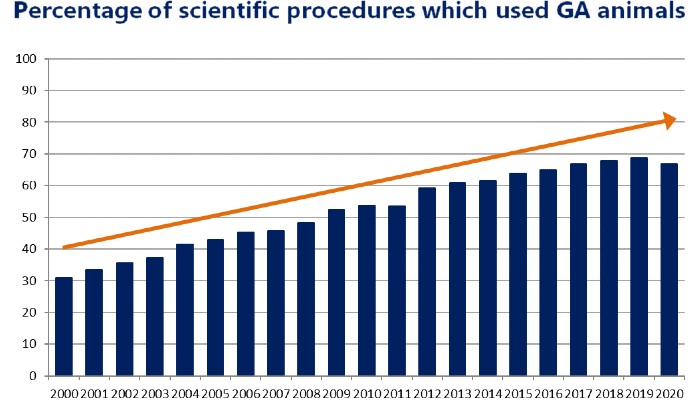Welfare of Genetically Altered Animals | RSPCA - RSPCA
Genetically altered animals
Genetically altered (GA) animals have had deliberate changes made to their DNA, for example by adding or removing genes, to give them a specific characteristic. Animals with the desired characteristics will usually be used to breed more GA animals for use in a particular area of research.
Here's more on why we're worried about it.
A worrying trend
The breeding and use of genetically altered animals has rapidly increased over the last 20 years and GA animals are now used in almost 70% of all scientific procedures in the UK.
Most GA animals are mice, rats and fish, and are used:
- To study how the bodies of humans and animals develop and function, and in particular the role of specific genes
- To study human and animal diseases, such as cancer or muscular dystrophy
- In the safety testing of some chemicals and medicines.
Some farm animals, such as chickens, goats, cows and pigs, have also been genetically altered:
- To produce substances such as antibiotics in their eggs or milk, which may then be used in medical treatments
- To improve the nutritional value of their meat
- To try to reduce the impact they have on the environment for example, pigs who produce less polluting phosphorus and nitrogen in their faeces.
Recent developments in science and technology mean that changing the DNA of an animal can now be done faster, more easily and cheaply and on a greater number of species than ever before.
However, the outcomes are often unpredictable and the procedures cause suffering and waste animals' lives. This is true even for newer 'gene editing' techniques (such as 'CRISPR'), which are claimed to be 'more precise'.
Our view on genetically altering animals
We're concerned about GA animals for three main reasons:
- Genetic manipulation has the potential to cause suffering - not only to the GA animals themselves, but also to the animals used in their production.
- More animals are being used - the increase in the number of GA animals used in research is reversing what was a downward trend in overall animal use.
- Animals aren't research tools - using vast numbers of animals in this way increases the perception of them as 'research tools', rather than sentient individuals, and lessens the value of animal life.
There are also well-founded public concerns about 'naturalness' and interfering with the integrity of the animals. These concerns should be properly explored and given due respect. We believe that gene editing animals should stop for all applied purposes, such as farming, until the risks to animals have been fully assessed and the public has been properly informed and consulted.
What we're doing
We actively engage with all people involved in the use of animals in science, from governments and regulators to companies, universities, students and animal technologists, promoting measures that reduce animal use and suffering by:
- Avoiding or minimising any pain, suffering, distress and lasting harm, and improving welfare
- Minimising the number of GA animals bred for use in research
- Helping students, researchers and technologists reflect on their attitudes to animals and their ability to experience suffering and positive emotions
To find out more about this subject, read our Eurogroup for Animals presentation on genome editing, our submission to the Nuffield Council on Bioethics on Genome Editing of Farmed Animals and our submission to the Biotechnology and Biological Sciences Research Council on future strategy for UK biotechnology and biosciences.
